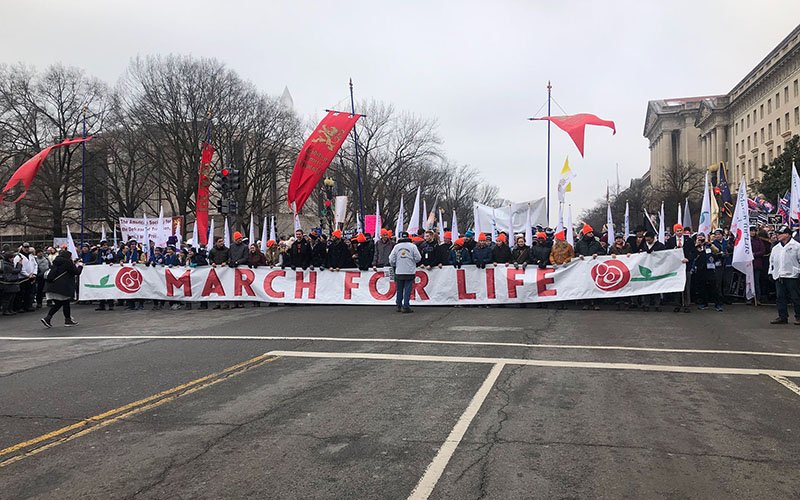PHOENIX – Arizona Gov. Doug Ducey, 11 other Republican governors and more than 200 GOP lawmakers on Thursday filed an amicus brief with the Supreme Court to overturn the landmark Roe v. Wade abortion ruling.
The 1973 court decision for women’s reproductive rights set a precedent for a constitutional right to access to abortion – and has been challenged ever since. The current nine-member court has a 6-3 conservative majority after the confirmation of the Trump administration’s three nominees – Brett Kavanaugh, Amy Coney Barrett and Neil Gorsuch – and the Supreme Court has agreed to hear the case, which was filed by Mississippi.
One legal expert at the Sandra Day O’Connor College of Law at ASU predicts the court will continue to chip away at Roe v. Wade without making the more controversial decision to eliminate it completely.
“Court watchers believe that the chief justice (John Roberts), in particular, is more institutionally minded and does not want the court to appear overly political,” associate professor Kaiponanea Matsumura, an expert in reproductive rights, told Cronkite News. “The question is whether any of President Trump’s appointees share the chief justice’s sense of restraint.”
Last week, Mississippi’s attorney general argued that the 14th Amendment does not include the right to abortion and that the rulings in Roe v. Wade and Planned Parenthood v. Casey disrupted the constitutional balance between states and the federal government. Ducey’s amicus brief to the case supports overturning Roe v. Wade.
“Every single life has immeasurable value. That includes children who are preborn – and I believe it’s each state’s responsibility to protect them,” Ducey said in a statement Thursday.
He argued for state’s rights, saying the decision to allow abortion shouldn’t be made by the federal government.
Thank you @dougducey for standing for unborn children and their mothers. https://t.co/VrPbTj6mQL
— Cathi Herrod (@cathiherrod) July 30, 2021
But Ducey’s move may not be popular with Arizona voters, according to an independent poll commissioned by abortion rights advocates NARAL last August that found 76% believe abortion should be legal, and the government should not prevent a woman from making that decision.
As the case awaits decision from the high court, abortion-rights advocacy groups are pushing for more legislative protections. The Women’s Health Protection Act, introduced by Sen. Richard Blumenthal, D-Conn., in June, would protect the right to access abortion care throughout the country.
The vast majority of Americans support Roe v. Wade. We can't let a far-right minority go against the will of the people and attack our right to choose.
Congress needs to step in. Pass the Women's Health Protection Act now.https://t.co/iUbxDEeFKs
— Women's March (@womensmarch) July 30, 2021
State Rep. Athena Salman, D-Tempe, told Capitol Media Services that Ducey’s legal efforts are “patronizing, sexist and extreme,” and she accused the governor of “abusing the position of his elected office to deny this fundamental piece of health care to the millions upon millions of people who will need it at some point in their lives.’
If Roe v. Wade were overturned, access to legal and safe abortions in Arizona could be banned almost immediatiely due to a pre-Roe ban on abortion, according to advocates at Center for Reprodutive Rights.
The Supreme Court is considering a direct challenge to Roe v. Wade—and Gov. Ducey just signed onto a brief in support of reversing Roe.
We anticipated this fight. Anti-abortion politicians have tried to chip away at abortion access or force the Court to rescind Roe entirely. https://t.co/QTi2Zi5aDz
— ACLU of Arizona (@ACLUaz) July 29, 2021
Your *objectively unfriendly* reminder that the vast majority (76%) of Arizona voters support safe, legal abortion.
Sit down, Governor. https://t.co/UgakW6Doxj
— Hannah Goss (@thehannahgoss) July 29, 2021
“Instead of focusing on the rising COVID-19 case numbers or educating the public to get vaccinated, Governor Ducey is concerned with denying access to essential health care to the state’s residents, all in the middle of a global pandemic,” Planned Parenthood Advocates of Arizona said on Twitter Thursday.
.@dougducey is finally saying what we all knew. He wants to overturn Roe v Wade and ban access to safe, legal abortions. pic.twitter.com/rR8M3bhNKF
— Planned Parenthood Advocates of Arizona (@ppazaction) July 29, 2021
Arizona Attorney General Mark Brnovich, who is running to replace Mark Kelly in the U.S. Senate, has signed a different brief filed by attorneys general that called for the overruling of Roe v. Wade.
Ducey has been a vocal, long-time opponent of abortion. In April, he signed a sweeping bill that makes it illegal to perform abortions based on fetal genetic conditions – despite medical professionals and legal experts warning that was not only medically unsafe but also unconstitutional. This bill criminalizes certain abortions and threatens doctors who perform the procedure with jail time.
Where abortion is legally restricted, unintended pregnancies ending in abortion increased by 39% over the past 30 years, according to a 2020 research from the Guttmacher Institute, a research organization that supports abortion rights, that was published in the medical journal The Lancet.
Roughly 121 million unintended pregnancies occur around the world each year, the Guttmacher Institute reports. Almost half of all abortions – a year – take place in unsafe conditions, resulting in 23,000 preventable pregnancy-related deaths. Globally, 7 million women are hospitalized each year for complications from unsafe abortions.


